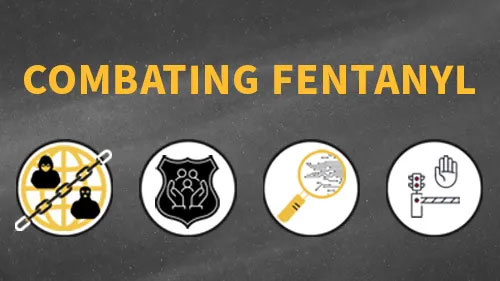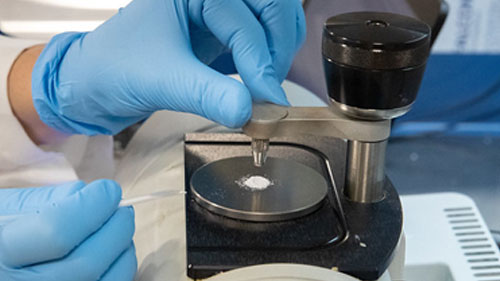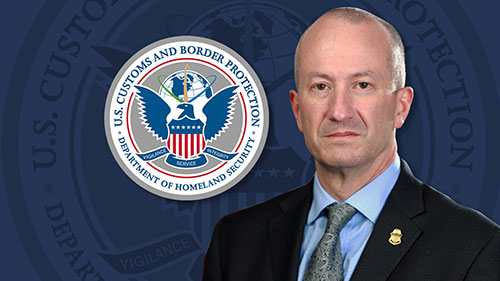Fentanyl is extremely potent and incredibly dangerous. Just 2 milligrams – the size of a few grains of sand – can lead to an overdose. CBP is committed to stopping the flow of fentanyl and the devastation it is wreaking on American lives and communities.
When it comes to fentanyl, the danger is real and deadly – one strike and you’re out. That’s why CBP is doing whatever we can to stop this dangerous drug from reaching our communities. But we can’t do it alone. It takes a team effort.
What You Can Do
CBP is taking a whole-of-CBP approach designed to lead the federal government’s fight against dangerous drugs like fentanyl and synthetic drugs to stop their destructive impacts on Americans. In light of this, in July 2023, Senior Official Performing the Duties of the Commissioner Troy Miller tasked a working group to modernize CBP’s strategy to combat fentanyl, other synthetic drugs and precursors. This new strategy realigns the agency’s efforts focusing on officer and agent safety, along with our communities. This new strategy takes a whole-of-CBP approach to the problem with CBP as the lead for the entire federal government.
“We've been at the forefront of this fight against synthetic opioids since the very beginning. We are committed to combating fentanyl, and the men and women of CBP are up to the task.”
- CBP Senior Official Performing the Duties of the Commissioner Troy Miller
We are using all of our authorities and capabilities to do this. CBP has seized more fentanyl in the last two years than in the previous five years combined, and we continue to optimize our intelligence and field operations to stop this and other deadly substances from reaching American communities. We are also using all of our resources and leveraging all of our partnerships to take this fight to those responsible for producing fentanyl and bringing it across our borders.
CBP is dedicated to protecting the American people and safeguarding our borders from fentanyl and other dangerous drugs. This is a fight we take personal and one we simply will not lose.
Enforcement Actions, News and Partnerships
More than 90% of interdicted fentanyl is stopped at Ports of Entry (POEs), where cartels attempt to smuggle it primarily in vehicles driven by U.S. citizens. CBP and HSI throughout the past two years have run operations that mobilized hundreds of personnel – CBP officers, special agents, import specialists, and intelligence analysts – through surges and deployments at Southwest Border POEs, airports, express consignment facilities, international mail facilities, container stations, and warehouses across the country.
- CBP announced Operation Plaza Spike in April 2024, leading an expanded, multi-agency effort to target the transnational criminals funneling fentanyl from Mexico into American communities. Operation Plaza Spike targets the cartels that facilitate the flow of deadly fentanyl, as well as its analogs and precursors and tools to make the drugs. It is designed to disrupt operations in the “plazas,” cartel territories located directly south of the United States that are natural logistical chokepoints within the cartels’ operations.
- Launched in October 2023, in Southern California, Operation Apollo is a CBP counter-fentanyl operation that disrupts drug and chemical supplies, collects and shares intelligence, and leverages valuable state and local law enforcement partnerships. Operation Apollo expanded into Arizona in April 2024. In July, CBP announced Operation Apollo X to expand that kind of collaboration to El Paso, Texas.
- Other recent operations include:
- Operation Blue Lotus, launched in March 2023, surged CBP and HSI resources to Southwest Border POEs and worked with state, local, Tribal, and territorial partners to expose networks. Operation Four Horsemen was a complementary United States Border Patrol (USBP) operation to stop fentanyl between POEs and at checkpoints near the border. As a result of these two operations, DHS seized nearly 10,000 pounds of fentanyl, and more than 10,000 pounds of other narcotics like cocaine and methamphetamines.
- Operation Artemis, a collaboration between CBP and HSI, targeted the illicit fentanyl supply chain, leveraging multidisciplined interagency "jump teams" at strategic locations. The four months Operation Artemis led to over 900 seizures, including over 13,000 pounds of fentanyl precursor chemicals.
- Operation Rolling Wave surged inbound inspections at Southwest Border checkpoints, covering every sector and employing predictive analysis and intelligence sharing.
- Last year, CBP seized more than 27,000 pounds of fentanyl making its way into the U.S.
- Synthetic opioid overdoses are the leading cause of U.S. deaths in people ages 18-45, making fentanyl a serious public health crisis.
- The synthetic opioid fentanyl can be found hidden in other street drugs.
- Fentanyl seizures continue to rise. It’s a dangerous drug – a dose the size of just a few grains of sand can be lethal.
- CBP’s total fentanyl seizures have risen dramatically in recent years. During FY 2024, through the end of August, CBP has seized over 19,600 pounds of fentanyl. CBP has caught more fentanyl nationwide in fiscal years 2023 and 2024 than ever before in history.
- Nationwide in August 2024, seizures of cocaine, methamphetamine, heroin, fentanyl, and marijuana (combined, by weight) increased 31% from July. This included a 113% increase in seizures of cocaine and an 84% increase in seizures of methamphetamine from July to August.
To report suspicious criminal activity related to narcotics smuggling, call the HSI Tip Line at 1-877-4-HSI-TIP.












